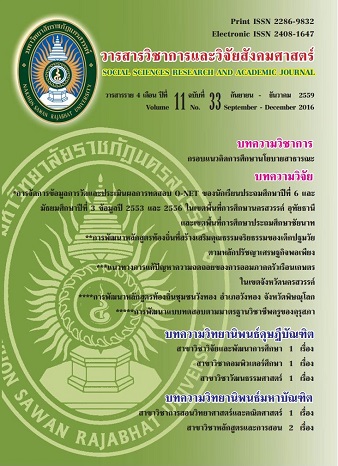การจัดการข้อมูลการวัดและประเมินผลการทดสอบ O-NET ของนักเรียนประถมศึกษาปีที่ 6 และมัธยมศึกษาปีที่ 3 ข้อมูลปี 2553 และ 2556 ในเขตพื้นที่การศึกษานครสวรรค์ อุทัยธานี และเขตพื้นที่การศึกษาประถมศึกษาชัยนาท; Data Management of Standard Test and Assessment O-NET
Main Article Content
Abstract
บทคัดย่อ
การวิจัยครั้งนี้มีวัตถุประสงค์ ดังนี้ 1) เพื่อวิเคราะห์วิธีการจัดการข้อมูลผลการทดสอบ O-NET จากโรงเรียนในเขตพื้นที่การศึกษานครสวรรค์ อุทัยธานี และโรงเรียนในเขตพื้นที่การศึกษาประถมศึกษาชัยนาทของนักเรียนชั้นประถมปีที่ 6 และมัธยมศึกษาปีที่ 3 โดยใช้ข้อมูลปี 2553 และ 2556 2) เพื่อวิเคราะห์ผลการทดสอบ O-NET จุดอ่อนและจุดที่ต้องพัฒนาของนักเรียนชั้นประถมปีที่ 6 และมัธยมศึกษาปีที่ 3 จำแนกตามกลุ่มสาระ และเขตพื้นที่ และ
3) เพื่อศึกษาแนวทางในการพัฒนาผลสัมฤทธิ์ทางการเรียนและผลการทดสอบ O-NET ใน ระดับเขตพื้นที่การศึกษา เก็บรวบรวมข้อมูลจากโรงเรียนกลุ่มตัวอย่างทั้ง 7 เขตพื้นที่ ได้แก่ เขตพื้นที่ประถมศึกษานครสวรรค์ 3 เขต จำนวน 153 โรง เขตพื้นที่ประถมศึกษาอุทัยธานี 2 เขต จำนวน 52 โรง เขตพื้นที่ประถมศึกษาชัยนาท จำนวน 48 โรง และเขตพื้นที่มัธยมศึกษาที่ 42 จำนวน 17 โรง รวมทั้งสิ้น 285 โรง
ผลการวิจัยพบว่า 1) โรงเรียนมีการจัดการข้อมูลการวัดและประเมินผลการทดสอบ O-NET ด้านการนำผลการประเมินไปใช้วางแผนในการพัฒนาคุณภาพผู้เรียนอยู่ในระดับมากที่สุด 2) คะแนนเฉลี่ย O-NET ของนักเรียน
ชั้นประถมศึกษาปีที่ 6 และชั้นมัธยมศึกษาปีที่ 3 สูงสุดคือวิชาสุขศึกษาและพลศึกษา ต่ำสุดคือวิชาภาษาอังกฤษซึ่งเป็นจุดที่ควรพัฒนาเร่งด่วน และ 3) โรงเรียนมีแนวทางในการพัฒนาผลสัมฤทธิ์ทางการเรียนและผลการทดสอบ O-NET ไม่แตกต่างกันโดยโรงเรียนได้รับนโยบายจากสำนักงานเขตพื้นที่การศึกษาให้กำหนดแผนพัฒนาผลสัมฤทธิ์
ทางการเรียนและคะแนนการทดสอบ O-NET ซึ่งโรงเรียนขนาดเล็กมีการปรับกิจกรรมการเรียนการสอนให้สอดคล้องกับบริบทของโรงเรียนโดยการจัดให้นักเรียนได้ทำกิจกรรมร่วมกับโรงเรียนที่มีความพร้อมหรือโรงเรียนมัธยมในพื้นที่ โรงเรียนขนาดกลางมีการกำหนดเป้าหมายในการพัฒนาผลการทดสอบและมีคณะกรรมการติดตามอย่างต่อเนื่อง โรงเรียนขนาดใหญ่ มีการวิเคราะห์เนื้อหาที่ใช้ในการจัดการเรียนการสอนที่สอดคล้องกับการทดสอบระดับชาติ และใช้เทคโนโลยีมาใช้ในการจัดการเรียนการสอน โดยโรงเรียนส่วนใหญ่มีโครงการสอนเสริมหรือการติวข้อสอบให้กับนักเรียนก่อนมีการทดสอบ O-NET โดยมีการติวโดยครูประจำกลุ่มสาระการเรียนรู้ ครูที่มีความเชี่ยวชาญพิเศษในสาขาต่างๆ และมีรูปแบบการรวมกลุ่มโรงเรียนเพื่อร่วมกันในลักษณะการเข้าค่ายวิชาการ
Abstract
This research aimed at 1) analyzing the method of data management of O-NET results of Prathomsuksa 6 and Matthayomsuksa 3 students from schools under the Educational Service Areas of Nakhon Sawan and Uthai Thani and under the Primary Educational Service Areas of Chainat by using the years of 2010 and 2013 data,
2) analyzing the O-NET results, weaknesses and points that need development for Prathomsuksa 6 and Matthayomsuksa 3 students as classified by subject content groups, and 4) studying ways to develop students’ learning achievement and O-NET results both at the school level and the educational service area level. Data were collected from the sample group of schools in 7 educational service areas comprising 165 schools from
3 educational service areas in Nakhon Sawan, 57 schools from 2 primary educational service areas in Uthai Thani, 48 schools from Chainat primary educational service area, and 15 schools from the Secondary Educational Service Area 42, totaling 285 schools.
The findings are as follows: 1) Data management of measurement and evaluation of O-NET results was taken into account in making the student quality development plan at the highest level. 2) The top ranking O-NET mean scores of Prathomsuksa 6 and Matthayomsuksa 3 students were in Heaith Education and Physical Education subjects, whereas the bottom ranking one was in English subject-the weakness that urgent development should be attentive to. 3) Ways for developing students’ learning achievement and O-NET results of schools were not different. To put this into practice, small-sized schools have adjusted student learning activities to be consistent with the school context by having the students do activities together with students of another school. Medium-sized schools have set their goals in testing results development and set up a committee to follow up continually. For large-sized schools, in learning management so as to be consistent with the national level tests. The tuition would be given by teachers from subject content groups or by teachers specialized in different fields in the form of school group for academic camping.


